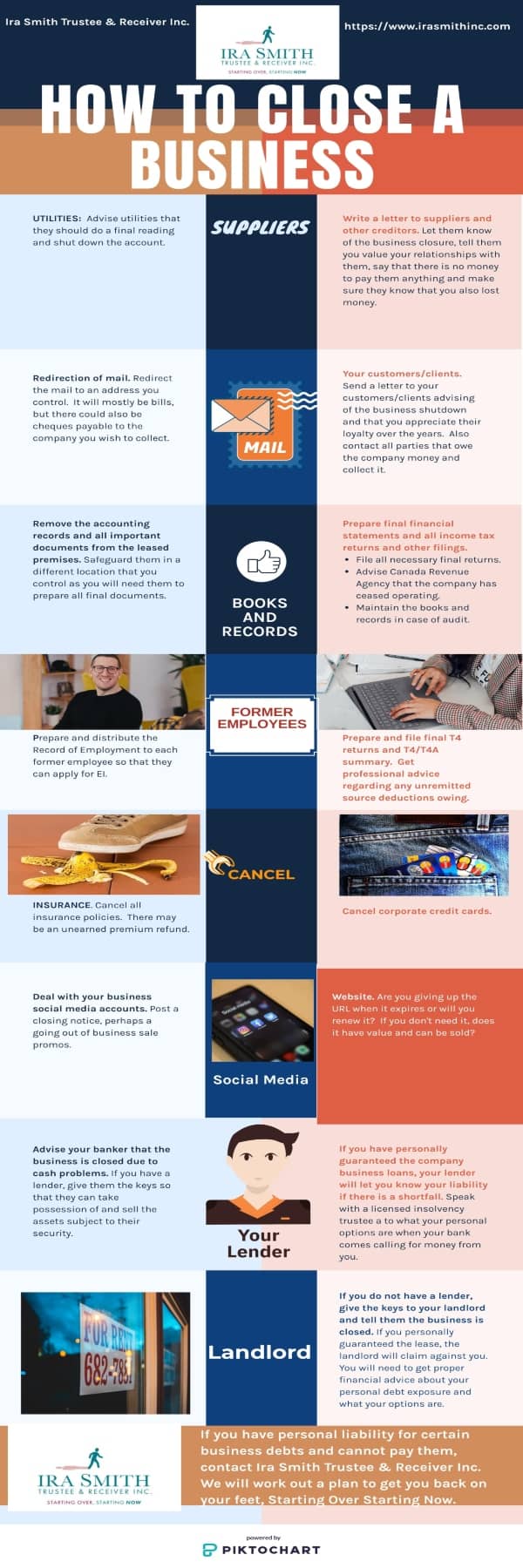The Ira Smith Trustee Team is absolutely operational and Ira, in addition to Brandon Smith, is readily available for a telephone consultation or video meeting. We hope that you and your family are safe and healthy.
Thank you for reading our Brandon's Blog. Check out our AI insolvency bot on this page and don't forget to subscribe!
At the end of this blog, we have a special gift for you!
Closing a business introduction
Many times I am consulted by an entrepreneur about closing a business. This may sound odd coming from a licensed insolvency trustee (formerly called a bankruptcy trustee) (Trustee), but not all business closures involve a formal bankruptcy. In fact, there are more business closures that do not involve bankruptcy
Now with so many businesses hurting due to a slowdown or complete destination due to the result of the coronavirus pandemic, I expect more entrepreneurs are going to want to know about closing a business.
In this Brandon’s Blog, I provide the reasons why. I also go through the various steps in closing a business that you can use as a checklist.
Closing a business that does not have many (free) assets
Many times I get a call from someone whose business is not doing well. They probably cannot afford to pay the business rent next month and it does not make sense to stay open. They think bankruptcy is the only way they have for closing a business. The business does not have many assets, or all the assets are secured by a bank that loaned the corporation money. Think of a business where the assets were bought through a bank loan. The funding may or may not have been under a government small business loan program.
The entrepreneur gave a personal guarantee to the bank ranging from 25% to 100% of the total loan amount. The entrepreneur may also have provided a personal guarantee to the landlord. The business may or may not be current in its employee source deduction remittances and harmonized sales tax (HST) payments. The entrepreneur does not believe the assets have any value above the amount of the secured loan and wishes to place the company in bankruptcy as the answer to closing a business.
Here is why bankruptcy will not help:
- The assets are fully secured by the bank.
- Canada Revenue Agency (CRA) may have a trust claim over the assets because of unremitted source deductions.
- A corporate bankruptcy will not solve the entrepreneur’s personal debt issues under the personal guarantee to the bank for any shortfall claim and the landlord for any claim due to the failure of the corporate tenant.
In this type of situation, there is not much I can do. I tell the entrepreneur that if they are going to shut the business down before the first of the next month, they should do so. Then, they should go to the bank, advise them and cooperate with the bank to allow them to realize their security. I tell them to make sure that they follow the steps for closing a business that I outline below.
I tell the entrepreneur that when the bank and the landlord each make a demand for their obligations under the respective personal guarantees to call me. We will then work together on their personal situation. Perhaps a consumer proposal will be possible. I also tell them that it is not worth spending the money they don’t have in order to bankrupt the company.
That is why in this case a corporate bankruptcy will not help an entrepreneur in closing a business. I call this the self-help remedy.
The business is still operating – will anyone buy it?
Before making any decisions about closing a business, you should first think in terms of is your business worth anything? You have spent many years building your business. It may be insolvent because it has suffered losses for several years, cash flow is weak and the corporation cannot pay its debts generally as they come due.
Although the current corporate body may be weak, you need to determine if your business is still viable. Does the marketplace still have a need for the service or product you provide? Are there competitors who seem to be doing well? Your business has a customer base and trained staff. One of your competitors may find your customer base and some or all of your staff something they want to amalgamate into their existing business.
If that is the case, you need to understand what your business might be worth. The selling prices of similar organizations in your geographical area or market will be a good barometer of what you can anticipate getting for your company. Innovative buyers might evaluate your business on the basis of projected cash flow for the next few years. They may very well mark down the worth of that cash flow to mirror the perceived threats and risks inherent in your business.
In the case of an insolvent but viable business, it may be that an insolvency process is necessary to allow the purchaser to buy the assets it wishes to purchase and take on all or some of your employees, maybe even including you.
The range of options available includes:
- a liquidating restructuring proposal;
- receivership; or
- bankruptcy.
So with the right insolvency process, the assets of the business can be put back to good use and be very productive. It may very well help get a good M&A deal done.
I have written before many blogs on how these insolvency proceedings could help in getting the healthy parts of a business into a purchaser while leaving the sick parts behind and then be used for closing a business. Those details are beyond the scope of this Brandon’s Blog.

When does corporate bankruptcy make sense in closing a business?
Corporate bankruptcy is not a simple process. An entrepreneur needs the advice of their lawyer and also needs to retain a Trustee. This costs money. More often than not, there are no free assets in the company. That means the entrepreneur needs to personally fund the cost of the bankruptcy process for closing a business.
A bankruptcy of the company may make sense in several situations. Some of the most common are:
- Certain government claim priorities need to be reversed and that only can be done in bankruptcy. The most common one is unremitted HST. Absent a bankruptcy, the HST obligation is a trust claim and will come before the claim of any other creditor, including a secured creditor. As probably the sole director of the corporation, the entrepreneur may be willing to bankrupt the company to put the HST behind the bank. The director may very well choose as part of closing a business, to take their chances on the claim for unpaid HST as a director liability, rather than increase the bank’s shortfall by the amount of that HST claim.
- There may be value in the premises lease. If the rent under the lease is below market and can be sold, a bankruptcy will be necessary. That is because the combination of the Commercial Tenancies Act Ontario and the Bankruptcy and Insolvency Act (Canada) Trustee has certain rights to sell the lease that the corporation tenant does not have. So, bankruptcy may be a good idea in that case.
- The security of a lender for which no personal guarantee has been given is invalid against a Trustee. The corporation may be able to restructure with that liability moved from secured to unsecured. Alternatively, a bankruptcy will allow for assets to be better protected for the secured creditors first and then provide some value for the unsecured creditors if there is a bankruptcy.
My closing a business checklist
This is what I tell any entrepreneur for a self-help remedy for closing a business that is most appropriate:
- Advise the utilities that they should do a final meter reading and shut down the account.
- Prepare and issue all records of employment to the former employees.
- Remove the books and records (probably computerized) from the business premises so that the information can be secure.
- Advise your bank lender that the business is shut down and that you are delivering the keys to the banker so that they can get their security.
- If there is no bank lender, and no trust claims over the assets, hold a going out of business sale.
- Tell the landlord the business is over and deliver the keys.
- Cancel insurance policies. There may be an unearned premium refund coming back to the business.
- Redirect the business mail to a different address. Most of the mail will be bills, but there may also be cheques you don’t want to miss so you can deposit them into the bank account.
- Cancel any corporate credit cards.
- Deal with the termination and return of any business license and permits.
- Deal with your business social media accounts, website, and any other digital or intangible assets. You will have to decide when it comes up for renewal if you wish to retain the URL in light of your closing a business decision. The URL may have a value that you can unlock.
- Make sure that the final financial statements and tax returns are prepared. File the tax returns with the government. If there is a balance owing, don’t worry about it as the business cannot pay and corporate income tax owed is not a director liability.
- Prepare and issue final T4 statements of remuneration paid. Issue them to the former employees. Figure out if there are any employee source deductions owing. If there is and you can pay them as it is a director liability.
- Calculate, prepare and file the final HST return. If there is a balance owing and you can pay the amount as it is also a director liability.
- Maintain the books and records as CRA may want to perform an audit.
- Send a letter to all creditors advising of your closing a business decision was due to financial problems, express your gratitude for the relationships you have built, tell them that there is no money for them and let them know that you have also lost money.
- Mail a letter to your customers/clients advising of the closure of the business and thank them for their loyalty and patronage over the years.
Closing a business summary
I hope you have enjoyed this closing a business Brandon’s Blog. A sick insolvent company’s business might be saved by a debt restructuring.
Do you or your company have too much debt? Are you or your company in need of financial restructuring? The financial restructuring process is complex. The Ira Smith Team understands how to do a complex restructuring. However, more importantly, we understand the needs of the entrepreneur or the person who has too much personal debt.
You are worried because you are facing significant financial challenges. It is not your fault that you are in this situation. You have been only shown the old ways that do not work anymore. The Ira Smith Team uses new modern ways to get you out of your debt troubles while avoiding bankruptcy. We can get you debt relief freedom.
The stress placed upon you is huge. We understand your pain points. We look at your entire situation and devise a strategy that is as unique as you and your problems; financial and emotional. The way we take the load off of your shoulders and devise a debt settlement plan, we know that we can help you.
We know that people facing financial problems need a realistic lifeline. There is no “one solution fits all” approach with the Ira Smith Team.
That is why we can develop a restructuring process as unique as the financial problems and pain you are facing. If any of this sounds familiar to you and you are serious in finding a solution, contact the Ira Smith Trustee & Receiver Inc. team today.
Call us now for a free consultation.
We will get you or your company back on the road to healthy stress-free operations and recover from the pain points in your life, Starting Over, Starting Now.
CLOSING A BUSINESS INFOGRAPHIC. CLICK ON THE INFOGRAPHIC TO DOWNLOAD YOUR OWN COPY
The Ira Smith Trustee Team is absolutely operational and Ira, in addition to Brandon Smith, is readily available for a telephone consultation or video meeting. We hope that you and your family are safe and healthy.


